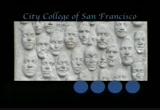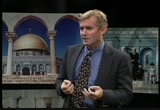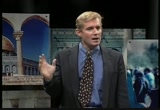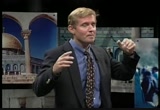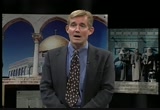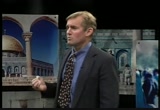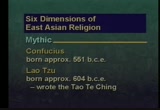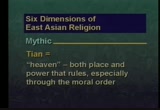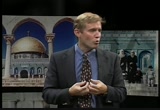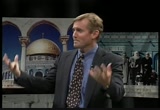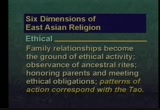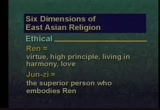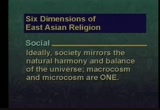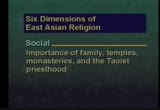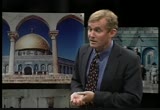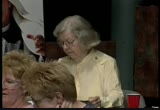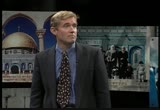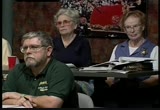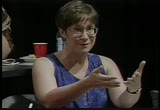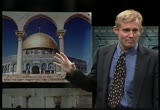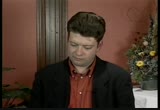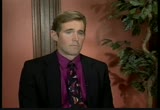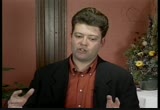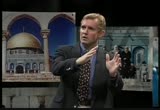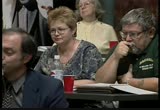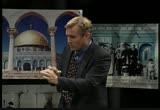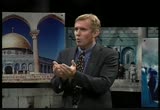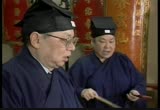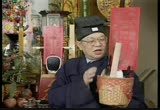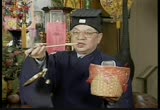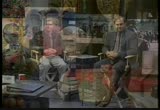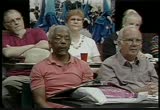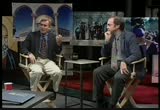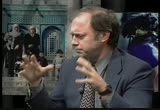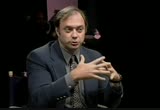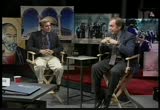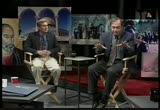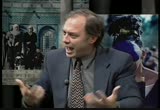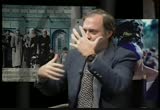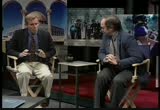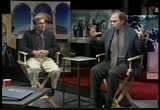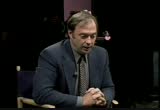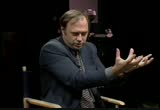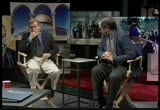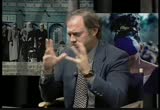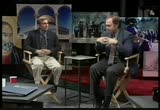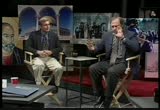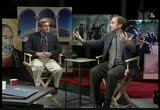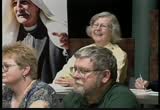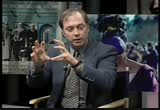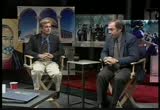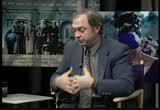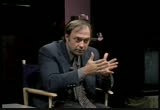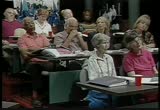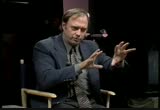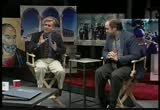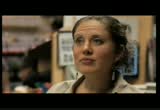tv Democracy Now Special LINKTV November 13, 2012 9:00am-10:00am PST
9:00 am
the eastern religion, with the world but it goes deeper than that because when we think about culture in china, it is a such an old civilization. and this symbol, besides its implications specifically within the religion, talks about balance, and harmony, and unity. and these are aspects of the eastern, the east asian world; touched on those a bit with buddhism, we'll see buddhism is in the mix, but the sense of the oneness, the unity of all things. now, think for a moment religiously how different that is. we don't have what i would call ontological dualism, we don't have a situation here where the world is here, human life is here,
9:01 am
we live in history, and god angels the forces of creation are apart from that. what if everything belonged to one system? we are moving along the line more on the line of a monist. how would you react, ethically, if you felt that you, though you might have a different position in this oneness, you were a part of it, truly a part, there is a part in a part thing you have been dealing with the whole semester? that's a part of the instinct, that move to harmony and balance. if all is one, and there is no way you can opt out of the system, then the impulse is to truly develop ethical patterns of action that honor other people, that keep a balance that keep harmony. now obviously as we've seen all religious systems, it's not always going to be at the ideal. but that's the impulse to try to sort out ethical patterns of action. in confucianism particularly, in society, in human relationships because those relationships
9:02 am
between human beings mirror that yin yang balance that we'll see that permeates all of creation from the great heavens, to the hells, to society, to people, and of course, predominantly nature. so, one gets the sense here with chinese religion in particular, that folks were thousands and thousands of years ago were looking out upon the natural cycles. and i can't help but harkening back to someone, obviously from a different culture, but seems to have gotten the same impulse which is cynthia jones. remember our little ritual we did up here honoring earth, air, fire and water and how she talked about the balance in nature and her rituals to try to bring her and her people towards that balance? well i am thinking thousands and thousands years ago, great chinese thinkers were observing the universe, observing the natural cycles and noticed that there is a constant flow from growth, creation, to disintegration,
9:03 am
and death. and that cyclical idea that balance seems to exist in nature, they begun to look for that kind of harmony that kind of expression in all aspects of life and then as these world views developed, confucianism and taoism, those engender a kind of a balance that we have here. so let me go through these graphics. what i thought i would do is simply pull some basic terminology out for us, give us some basic language. and i thought i would do it since we are so well educated now, it's about time to kick us all out into the real world and use our six dimensions of religion. i thought i would take our six dimensions of religion, put it in that framework and just, we are not pretending as always that we are learning everything about east asian religion, but what we are trying to do is draw out some key answers to profound life questions here. anyway, looking at the graphics. first off,
9:04 am
difficulty number one, if we haven't already listened to some other difficulties for westerners looking at this, we are so used to labeling. but when we think about the picture of chinese religion, it's a combination of confucianism, taoism, and buddhism in the mix, perhaps some christianity, some folk religion. we'd move to japan and we'll see the same set but also with shinto elements in there so it's a full world view, a full lifestyle, we have to keep that in mind even though we are dividing things up. so looking at the experiential dimension, identity and relationship. well, number one point that i can draw out of my look at the material is the universe is one. that's the identity, we are a part of it, we're not separate from any other aspect we are interconnected, that key word again. relationship; to live in harmony with the tao many of you have heard of that term in terms of taoism, but the way, the power,
9:05 am
the essence the stuff, the force be with you that's what keeps coming back to me from the force. to be connected to that and once connected all relationships, all activities hopefully will work in harmony. and that's, it's a principle through which nature works. so that's the experiential dimension. couple of other key points, key words here; and you'll have to forgive me, i got a d- only because the teacher was nice, in my chinese. actually i didn't take any chinese, that's why i did religion in america, so i can get out of grad school sooner. people who took the east asian religions are still searching out their phds as they struggle with this language. so forgive me but basic terminology that we see drawn out of the tradition of chi- material energy, li- the principle of spiritual energy and together the two combined to be the essence of everything that exists. so, inside me, inside the table, inside everything
9:06 am
that's in this room, that's going on, that kind of balance here. mythic; two names it's a vast panorama of scholars, and princes, and kings, and dynasties as you may well know but the two key names that come up in the mythic dimension; in other words the great leaders, if we must have leaders. confucius of course; the great scholar, drawn from his name becomes confucianism and lao tzu the mysterious. some say he didn't even exist; we're not sure when he existed but the composite leader-- and we will have an expert thank goodness on here because i am certainly not one. dr glenn shive will be with us to help us sort through some questions. but i couldn't help but think when we look at the yin yang symbol, i'm sure this is an original insight in terms of chinese religion, but confucius is very much like a yang side with lao tzu as a yin side in that own struggle for balance
9:07 am
and making sense of the tao. so we will look a bit more on those two great leaders. other elements in the mythic dimension? heaven, now this is i thought, should i put this in or not? because we are thinking here if i start talking about heaven it's a bit confusing because we are sounding like we are separating heaven from earth as one might in christianity, or judaism, or islam. not so because heaven is also interconnected and in essence contains the same substance. but over time it takes on more philosophical authority and nevertheless we can see as both a place, but also a ruling order, especially in the moral order. and since we're talking about the ethical dimension, we want to be looking at that so, tian - heaven. and of course in the mythic dimension, yin and yang. the balance between female principle sometimes represented by, as the tiger yin, and yang the male principle
9:08 am
as the dragon not one, not a good, or bad, or right, or wrong situation it's the constant search for balance in any situation. so we are actually going somewhere with this folks, and it's heading towards the ethical dimension. because, how we relate to each other, this call towards balance, and reciprocity, and complimentarity, rolls out of this essential world view that all things - that balance can be found in all things. so ritual dimensions; li - not to be confused with the other, it's the same term, but we see different usages for it here in the ritual dimension. ceremony behavior; many of you have seen elaborate taoist rituals, or perhaps the tea ceremony, or some ritual of this sort in which you see the very organized and ceremonial way that all movement is guided
9:09 am
and all interaction. it's an essential concept and it's also in confucian education. ritual offerings to the ancestors, ancestors are very much part of it and we are going to go to a taoist temple in san francisco and we'll be seeing some of that ancestor worship. doctrinal; see you can do this at home folks, you can take any world view and take your six dimensions and plop it down and pop up comes all this great information. but, for us the doctrinal dimension includes the interconnected teachings of confucius, lao tzu, the classics that are mediated down through the educational system, the great systems of scholars in the confucian world. this is how people begin to take something as ephemeral as the tao and bring it into a clear statement of what goes on. ethical; our dimension and what we are going to concentrate on. and the reason why i felt
9:10 am
we would at least touch on east asian religions at this point in the course, is because family relationships become so important, they become the ground for the ethical activity. dr. shive can help us out with the relationships within confucianism but that was a key point to confucius; that we see leader and in this case subjects. the key relationship was father and son, then husband and wife, then elder son and younger son, then friend to friend. how one relates, the idea here is for confucian, in particular, is the system of relationships will work, we just have to raise ourselves up to a moral level here. so family relationships are very important to bring us into correspondence with the tao. other points in the ethical dimensions i might bring up; i had a wonderful woman from china this morning trying to teach me how to say
9:11 am
this two words, and i don't even have the mouth for it. but, like ren and here we have a virtue this is the highest principle living in harmony and love. this is something that one embodies. a virtueless person contains or embodies or manifests ren a person who does this is the jun-zi, the superior person who embodies it and that's the ideal, to come into harmony if you're connected and harmonious with the tao, then you have it. and finally we are getting to the end of our dimensions here. the social dimension; we're at that transitional process and i hope the class works for you, at least it worked for me when i was thinking it up, but we are moving from the ethical dimension into the social dimension and that's a key point. as people behave individually and collectively then it manifests and impacts
9:12 am
on the social dimension and we certainly saw that in our previous class on the middle east. well here, ideally, and we all know what ideals are worth, they are worth the people who embody them and what they do with them, but ideally society should mirror the harmony and balance of the universe. and the whole quest within this combination or constellation of world views is to achieve the good life, we've talked about ethics as the good life, to achieve that through understanding, and responding, and developing reciprocity embodying the tao so that the relationships in society near the harmony in the universe. and if we did that, then ideally we would have heaven on earth. in some systems, there was even a sense of immortality if you truly embodied the tao you would overcome mortality. but that was in a strong emphasis
9:13 am
in the eastern traditions because other than ancestors worship it was a very this - worldly focus so, that's what they have. also another key thing in the social dimension; importance of family, the temples, the monasteries and in the taoist tradition, the priesthoods. so the social dimension, i think you get that flavor sometimes it seems rigid, i mean how different americans, our individuality. i think of the chaos of my own family and you think, where is this beautiful relationship between father, and mother, and son, and daughter, and dad, and dog, and all this things? well, who knows? because we don't cultivate that but here we have a very different picture and these are extremely important. and i can't help but think one of the great challenges of this particular nation and in a matter of days and years of this millennium, is sorting out values and
9:14 am
relationships within the family. family issues every time the politicians get out, but i think there is something deeper than that, we are questioning what are the proper relationships? well here is a religious tradition that has come down through millennia and millennia that puts the focal point on that. that one can reach the harmony of the universe if we know truly and harmoniously how to relate to each other. so, fascinating stuff but very, very ethically based. any questions you might have? now remember, we have dr. shive coming on to answer those, truthfully there should be something going across the screens saying "this man doesn't know what he is talking about," but we wouldn't do that. but, any initial comments before we see a couple of roll ins that - >> are these according to priority they actually consider the family most important and then temples, then monasteries? >> i didn't prioritize them, no - on that perhaps dr. shive could help us out when we get there. i drew from a whole list
9:15 am
of things that i noticed some would not be more important to others so temple like monastery are not going to be more as important within the confucian world because the education is going to be more important. yes helen, and then val. >> in the hunter crowley book, as they discuss the social and ethical dimensions of each of the religions, they have a series of questions they ask each one and they always include status of women. now we don't have a lot of emphasis on that in this course. i guess you are saving that for your next course on women and religion. >> well, i did a whole course on women and religion that's true. i actually did one and, but you are right i am saving it for beliefs and believers three, when women return. but you are right helen though, and most texts that i have seen acknowledge that it's coming from a patriarchal perspective. and there are apologists within confucianism and other areas have very - have cogent regions to them on why the primary relationship
9:16 am
should be father and son but there is not doubt that we are once again looking at a cultural setting that draws on a male order thing. it's beyond my understanding, and we will have to save it for beliefs and believers three, but how when we are talking about balance, how then do we find a leaning of scenes in terms of relationships of importance to men. so it's a tough one. yes, val. >> daisha dan, the late paleontologist, had this idea that we are all spiraling upward and we will all become one at the new sphere - and that's the idea, the idea of oneness comes into most philosophies, the good, the oneness, the truth, and the harmony is there. >> you know tilardaisha dan is one of my favorite readings because you get that idea of an evolutionary mode leading to oneness. and i am glad you
9:17 am
brought that up because notice once again how many times in this class, i haven't been keeping track, but how many times in this class have we seen an essential idea that leads to oneness to unity? i often think that religions take many forms in society but the motivation seems to be - and here when we talk about thousands and thousands in pre historic times in which chinese people are sitting there thinking, we are separate but we should be one. why is that always such an impulse? amazing. yes, glen? >> tilardaisha dan spent about 20 years in china. he was a paleontologist who was sent out from paris and did a lot of mapping of the terrain and was part of the discovery of peking man, in fact. so, here is a christian deeply committed in his own paradigm but spent all that time in china and asia absorbing in a sense that the imperative of finding oneness and he found it
9:18 am
in a powerful way. >> and so true that you get that feeling of oneness instinctively from being in that world view. yes janet, then we go to the roll in here. >> i wanted to go back to the relationship idea for just a moment - maybe the reason that doctrines define the male relationships is that the relationship of the female with offspring when everybody has got a mother is just a biologically programmed thing. those two beings share body cells together and it seems that this doesn't even need words to describe that definition of that relationship with ones mother. and so it maybe the male relationships need more definition because they don't start out with that level of oneness. >> well, that's exactly the somewhat apologetic explanation i came across. that it's so biologically with a mother that's it's more difficult to develop a relationship between
9:19 am
father and son if anyone here has been a son and had a father you know how that is so - so that we can - we've already met dr. shive, glenn shive here he had a wonderful comment but we are going to get him up here and get more of a dialogue but before that, let me go to our roll ins. if we - let's just put the yin yang symbol up one of time. i'll see if we can, if i'm not going to blow the circuits in the booth. but if we can't then you've seen it, the yin yang symbol because - there it is! we didn't blow the circuits in the booth. thinking about the yin yang symbol used to be on the back of every hippies back pack back in the 60s here, a lot of different meanings. but now we are going to here from a scholar james miller from boston university, we are going to here a scholar and then dr. shive could come in and help us out further, explain exactly what this means in that context. so if we could, james miller from boston university. >> well first of all yin yang isn't just
9:20 am
a taoist idea. and it's something that is, that forms the basic cosmological outlook for the whole of the chinese religion. however, it is true to say that it is something; it is a symbol that has particular application in taoism. now the yin and yang respectively mean the shady side of the mountain and the sunny side the mountain. and if we imagine the mountain and you see the - and throughout the course of the day as the sun traverses over the mountain, part of the mountain at one time will be in shade and towards the later time in the day it will be - that part of the mountain will be in the sunlight.
9:21 am
and so from this just sort of very, very basic observation we can discern what is for the chinese conciseness the fundamental process that underlies everything that happens in the whole of the universe which is a dynamic process of arising and decaying and everything can be viewed in this framework. in western ways of thinking, we tend to see opposites as being concretely opposed to each other. and opposite means competition, discord and the yin yang symbol however shows yin and yang not to be contradictory and opposing, but in fact the means of in which oppositions come together to form a harmony.
9:22 am
and this basic outlook, this basic chinese outlook is that opposing forces can always, in some sense, be harmonized, brought together. so opposition doesn't necessarily lead to conflict or absolute opposition, because there is always a means in which it's possible to think of two things working together, sort of side by side like interlocking my fingers interlocking. >> when you think about it, that idea of balance; it we're so used to seeing things as opposites and dualisms in western culture for a variety of philosophical reasons and tradition. but i often think of it as a continuum and back to that buddhist idea of no self independent in origination if somewhere on a continuum between opposites
9:23 am
you find a place, you find where you are and that's the process through life. i guess how you work towards the tao is you find how those opposites work but that image. i love what james said here because you really can imagine a quite chinese shepherd out in the field and just spends the whole day under a mountain and watching the sun coming up one side and then the shadow comes on and just that sense of how nature works that way and out of that begins to develop a world view. but you've got comments. sure - >> i remember writing a paper some years back and i was studying the difference between the western and eastern way of looking at life. and they said that the easterners are more three dimensional, they think of the world as a ball or the way they think
9:24 am
has more dimension to it. whereas western man it's either black or white and they can't deal with gray areas. it really causes them big problems, and they gave us as one example of the eastern way of settling problems in society in the small village, they would have a mock war every year. and it was just amazing, they got all their frustrations out or something. i don't know and it was a very, very settled area and people worked in harmony. but they said this somehow took care of certain tensions. >> and another thing that just jumped into my mind, to go back to something very unconnected, with the harrison sheppard interview about lawyers and people not constantly fighting with each other finding some balance and i think that's part of why does -
9:25 am
why do we have to have conflict, why can't we find something along a line of agreement? sure go ahead, jan. >> i especially like the mountain story because as the day progresses the side of the mountain that was yin becomes yang and the side that's yang becomes yin. so nothing purely yin nothing purely yang but with elements of each other. >> and that's the dot, the corresponding dot that one is never separate there is always, at the darkest point is where the light begins. that kind of element of balance seems to elude us. well we've heard from an expert, let's go to a real live setting and here we have extraordinary opportunity, you don't find taoist temples on every corner here in america. but we happened to find one on the corner in san francisco, imagine that. in, of all places china town, so we - it was an amazing situation because it's such a colorful exciting world. the quest for the balance, it's not within this taoist tradition particularly as it's
9:26 am
rooted to more popular culture, it's by no means a quiet meditative stage type thing. it's very colorful and lively. so we went to the ching chung temple in a - a taoist temple and spoke with reverend wilson lee who begins by some chanting, and then shows us a planet basket and once we've seen this i am going to have dr. shive come on and perhaps give us a little bit more background on what's going on with this - what i call the microcosm, macrocosm ideal that reverend lee is playing for us. so if we could let's go to our roll in at the ching chung taoist association. [chanting]
9:27 am
9:28 am
we use the wooden one like this. but in america, you cannot buy this so we use this for stand for planet. and ery year in september, in chinese calendar, we have a nine day ceremony from the first day to the ninth day. it's to pray the mother god's birthday. and this paper back it's - to put the people's names on and sometimes put the date of birth. it means it stands for his planet belong for this guy. and also thirur it means people, how long your life, so you should measure. if you do some good things your life longer and strger, wealthy, healthy.
9:29 am
if you do some bads may be measure shorter and suffer too much. and this scissor it means to cut all devils away, cut all the bad away. so this tiny scale, it means to weigh. how many good things you have been done, how many bad thing you haveeen done, so wis there balance or not? this mirror, just take a look it change you from bad to good luck. they [inaudible] is brilliance for the whole year and this long [inaudible] for yourong [inaudible]
9:30 am
and this wrapping candy sweet always sweet, no bit, no sharp and these two lucky bet for you lucky the whole year. and some rice inside of this ceremony you take it back to cook it for whole family, of the dead may be cook healthy [inaudible]. >> well we're very happy to have dr. glenn shive with us thank you very much for coming down here. >> pleasure. >> i'll definitely need some help as you can tell. let me - you're going to china in a couple of days. >> indeed. >> but just a little back ground your interest in china and chinese religions. >> well i studied religion in temple university in philadelphia. and then went in to chinese history and my degree is in chinese history, modern, but also always interested in chinese thought and the classics. i went to taiwan in the years
9:31 am
before it was possible for americans to go to the main land to study, i studied classical chinese and so the great writers, philosophers and thinkers at the time and then i ended up writing my dissertation about mao tse-tung, so very i'm much in the contemporary era. so i've kind of done a lot of things in taiwan to shanghai where i taught at east china normal university and later in hong kong, where i'm going again as a full writer. >> okay that's good. how long did it take you to get through grad school? >> that's right, i did it - it's a lot to absorb but i was - actually it was nixon's visit in 1972/73 that opened up in a sense china to the u.s. they saw it as opening china outward to the broader world and it intrigued me and i said this is going to be big and we need more people to know what's going on between our two societies. >> absolutely and as we are - you were here in the first part of the class and of course where we are in beliefs and believers is we're coming to the end
9:32 am
of looking at what we call the ethical dimension which has to do with proper patterns of action looking for the good life and looking towards the social dimension. we've gone through some notes here and we've had a chance to look at them. but, just from your perspective, how close are we in saying that in confucianism and taoism it cuts to the core of the family? i think susanna raised a question about the priorities but, how so this family relationships? >> family is at the core, family is the principle metaphor for the whole culture. and even in that little take at the very end he said you take it home and cook it for you family, right? so whatever happens the final sort of reference point is the family. that all relationships are based on family relationships; the father/son, the husband/wife, the brother/brother, are the working-outs. i mean, this comes from our intuition universally that these relationships were the first ones in where we learn the relationship
9:33 am
so that the formation experience of child to parent and parent for example sets the relationship in the political realm between the emperor and the subjects that the father emperor and the subject should be as a large family. so the whole state is in a sense an extension of the family and the family life is where these ritual relationships are developed and worked out. even down to some practices where you sit at the table, sense of positioning as was mentioned to this - even in the cosmos where is your position in the world comes to where is your position at the table when you eat at the family core. so, you could never go wrong by referring any question in the chinese cultural religious ethos to how does it work as a family metaphor. >> now i want to - go ahead susanna i've got lots of questions but - >> then where are the females
9:34 am
in this picture, because your references again are to man/wife, father/son and not father/mother, and yin and yang it seems equal? >> that's the question i had too, yes. >> well john is right, it is a patriarchal society has evolved that way and may be in a sense - confucianism, as it became institutionalized in the hong dynasty about 2,000 years ago, long after confucius by the way, but they set up these rules to basically one can say, reinforce a patriarchal system. but, in essence the yin yang relationship is not just sort of male/female and dominant/recessive, it is more dynamic than that. it's more like the light on the mountain, and the light in the morning, and the light in the evening, that you can't have one without the other. that each depends on the other for its very existence. that's that interdependence sort of aspect here that the dot on the other side that,
9:35 am
high and low, light and dark, life and death. you can't have life as we know it without the concept of death. in fact, this harmonization of opposites is i think an opening to looking at male/female relationships in a positive way. not just statically saying one is above and the other is below, but to say that we're constantly doing things for each other. and that that evolves in society and we are not in an agricultural society any longer we can throw away a lot of the old patriarchical sort of reference points of the early religion but keep the original essence of the insight, that we really do depend on each other. >> it feels to me that may be just exactly what this next millennium is all about, because those of us here now, we are pushing things over the cusp on that and it just makes sense. >> sure and it is very different in our experience but the effort here is to sort of try to
9:36 am
imagine the cultural social economic ethos that where from which this religion came. and to say that it has a logic with out with holding a bit, our judgment that was wrong because that was dominance, that's too quickly i think to sort of impose our thoughts, they were operating appropriately perhaps in their context and it evolved. >> my girl friend was raised in the east asian culture and every single time i spoke with her she would ask me, "how is your mother?" absolutely every time. it didn't take me long to pick up on this eventually i figured it out and i would ask her then every time i saw her, "how is your mother?" so there's a part of this that's not defined but it's intuitive, it's just automatic she would always say to me, "how is your mother?" >> almost more than "how are you." >> almost more than "how are you." >> which - what does that mean?
9:37 am
that says that you are an aspect of your mother, i can't see you without seeing you as a mother/child relationship - >> the interconnection - >> the interconnections. so, americans will tend to see, "ah here's an individual." you are sitting there, you are one person, well you are in a class, you're in an array of relationships, let's put this person in that context of relationships rather than struggling to sort of pull out instead of this is me and who i am, no, let's put ourselves back into this nexus of relationships that really do give us life and give us definition. >> i've always thought about that in terms of teaching, that we're so used to; i teacher, you student, and while there's certain levels of respect that would fit into a confucian system, that's a bad kind of barrier because we are all in this together and you need to understand yourself in that context and i think that breaks down things. now anita i know you had a question - >> yes, i'm wondering where does the robber, thief or murderer fit in where the family is concerned in the yin yang concept? >> well there's definitely
9:38 am
evil out there, and the fellow had the scissors to cut the sort of the bad forces that are out there. one needs protection, i mean this is folk religion and all folk religion sort of well, represent this experience that there's bad stuff out there and one has to be aware and protected. we can think in terms of complimentarity and - but even there, what is the concept of good without a concept of evil? i mean they are binary relationships yet, in the west we see them as constantly in clash, right? good will win out over evil, good must destroy evil, or is one or the other in the zoroastrian more western tradition. but in the chinese world, it's never one or the other. is that they are always living, in a sense, co-terminusly, always together. defining each other and also the
9:39 am
concept there of luck we saw, i mean these are inscrutable things about how the universe is put together and why things happen to us. and we want to wish each other luck as things happen that don't know where they come from and why. >> this is a question that may take a whole other teleclass to answer. but, just instinctively i'm struck by how radically different the eastern way of perceiving the world is and the asian way, why? anything that comes to mind how could such diverse ways of understanding reality emerge and then, bring forth different religious expressions? >> i don't know off hand that's a deep, deep question how that emerges - >> it frustrates me - >> i understand, where does this - what social experience really had to be there to create a context where this was
9:40 am
the insight that emerged. and i think that the period of confucius and lao tzu - s chaotic time, it was time of civil war, it was a period of the collapse of the feudal world with clear definitions that somebody was on top because of title, and somebody was below because they had no title. and these warring feudal states were just killing each other off and making life miserable for ordinary people, and confucius sort of emerged in this environment and said, this can't be right. and it was a combination of let's go back to the origins and understand where we came from, this instinct to go back to how did all this begin and then also to sort of develop a kind of a provision for how to order society re rationally,cefully and of course confucius
9:41 am
and taoism have radically different solutions. out of this original concept of sensing the oneness of human beings with each other and with nature the confucians came out in believing we need a government, we need an ordering of society, we need a benevolent but vertical set of relationships. whereas the taoists sort of emerged from this experience said, "that's part of the problem, in fact." human beings are trying to fix it and nature doesn't get fixed. you let nature be and if we're a part of nature, in a sense they became anarchists and the logical conclusion from the taoists is to go off into the woods and be by themselves. but in a sense nothing is - it's not a sort of like a confession where i'm a confucianist and i'm a taoists. there's a saying that,
9:42 am
in china you were a confucian hat and a taoist robe and you have buddhist robe and a taoist sandals. so that people clothed themselves in this set of religions and you call a dynamic system of religion. the taoism was originally chinese. buddhism comes in later, translates itself with taoist terms but buddhism brings in a more sophisticated theology. and an organization creates a church, creates monasteries and taoism then in a sense responds to this and becomes itself richer. and confucianism mean while was the kind of religion of the state of in a sense wealthy people. and you have people making eclectic combinations of all of these thoughts. in a way, kind of like we do now because rather than maybe before one grew up as a certain profession and this was truth
9:43 am
and against the others where as now we live in a relativelistic kind of religious world where individuals are sort of expected to think through on their own and acquire pieces and aspects of different confessions and in their own life philosophy so, it's a more open and flexible place, it's along period of history. >> you know the - and this is also and helen i want to [laughter], this is you've obviously done studies in the current political situation in modernity. and we're looking to china of course speaking of the ethical and social dimension as hopefully being partners, as being allies. how important do you think it is, even though we've gone through the long period of communism when the traditional religious systems were repressed, how important do you think it is that a religious or at least ethical political dialogue take place between
9:44 am
the united states and china in order for us to sort some of these differences out? >> i think very important and it's one of the promises of the dialogue u.s./china relations is opening up for the ordinary people to participate and have that dialogue and we bring our perspectives to bare, but we need to articulate them one to the others so that we understand them better. china has gone through a horrendous time in the last 200 years, it's been a bad century in chinese terms but, and part of this period of time there was communism, you mentioned. and it's ironic because communism is based on a notion of class conflict, right? either or there's this period almost of adopting an external philosophy communism to drive - the conflict drives history, in the hegelian sense. even to the absurdities of the cultural revolution in the 1960s when student were revolting against their teachers
9:45 am
and against their parents and this was, until ultimately there was a total disgust in a sense that china threw this out and returned to more in the sense that ultimately we have to develop complimentary yin yang relationship versus one class set against the other. so i think china in a sense is returning to more of its own origins. it is a complex question about the role, the status of religion in china today. and there's a lot of discussion in the u.s. about - we believe and value religious freedom. there is a kind of renaissance of religious life in china. the combination of both indigenous religious like buddhism taoism are of our greater interest in a context where certainly marxism doesn't mean very much to anybody any more. and there is a growth of christianity in china.
9:46 am
a lot of indigenous home churches are growing up and there's a complicated relationships about, sort of, the catholic church and rome and recognizing. see, china is emerging from a kind of period of humiliation from having been dominated by colonial powers of the west. and many times they perceived religion to have been part of the bible and the canon came up the river on the gun boat. and they said, to reject the foreigner and give us our own place, then they associated religion in that kind of act of domination. so, i think that though over time, there's what they call, the three self movement where as christianity in china is quite alright as long as it's self financing, self instructing and is self governing. so that it's not is a sense an extension of foreign western power,
9:47 am
so they are very concerned about that. but, china is loosening up and people have much more freedom to explore and read and think and discuss about the ethical issues and the principle questions of the meaning of life. and they don't get it from the state, and they are very curious, and the media is much more open to bring in ideas and images from the outside. and, i think there's a new, there's a pluralism of belief that actually befits a very large and ancient society. >> you are touching on the ethical dimension, also is important and i think the media needs a bit of education there too, because unless we have an understanding of the different way of seeing the world we get even horrific events like the tennemen square event, that as bad as it is it doesn't help it if it's framed in a ethical frame work that befits a western mind
9:48 am
when the event occurred in a whole other context as being seeing here. now helen i've been promising - >> i want to get back to your question why? why this great difference in world view between the east and the west and i have educational experience by sponsor of a chinese scholar for a couple of years and every time this question came up, why? the answer was 6,000 years of continuous civilization. in other words, not too subtly, he was saying, "we've had more time to get further along than you guys, you're still just getting used to painting yourself blue and coming down under the trees, where as of that time we were already developing taois on the confucianism and so we've simply had more time." so the stock answer was "6,000 years of continuous civilization." >> the chinese - there's some truth in that, and there is great pride in chinese culture in that very feature. that in contrast to -
9:49 am
in the western greek and rome and we know the format of features of our own western world view but there was a lot of break and disconnection and interruption. whereas in china, you had relatively isolated from the rest of the world, a kind of continuous civilization that kept sort of building on itself and evolving with it self and therefore could naturally evolve behind those mountains and far away from the pathways of few on the silk road would go back and forth between china the hun and the roman empire but, really they were on their own for quite a lot and may be it just takes time on your own to come up with a different view. >> i wanted to go back to what dr. simmons was talking about and that is, with the political upheaval with mao, and so forth and the current curbing of population by saying
9:50 am
one child per family, how is this going to either erode or strengthen the confucian idea of family and there other related religions? >> it is a very good question because it's something they are facing right now, the first generation of one child family is emerging in the collage campuses there. it started in 1980, when i was in shanghai, remember the campaigns to sort of first walk through the streets and sort of have one child, and this was so against what people had been otherwise taught. and, to think of a culture that when you grow up you have no brothers, no sisters, no uncles, no aunts, no cousins i mean think in our own frame work, in our own culture how important these relationships are to us. and here we have a whole society of single child people. and the crisis in terms of
9:51 am
not one set of parents for ten children taking care of them in their old age, but now the pyramid is reversed and you have one child who's taking care of four grand parents. so you have, in a sense, a demographic time bomb in china that's slowly ticking, yet given the expansive population of 1.2 billion people, they had literally no choice but to curb population and in a way that seems draconian to us and indeed draconian to them. but we see people in urban environments are very constricted housing, they understood that to continue without regulation would create a population pressure that would eat up any surplus they would ever create. and they have especially in the country side this is still not very well under control, but in the cities those one child families are emerging
9:52 am
more and less like the middle class of the west, where people - where the single child is of the parents and they go of to school and - >> my question really was, how is this affecting their religious beliefs? >> well the family structure is no longer, this extended family is not the same metaphor for which is based in the agrarian society. so the new metaphor for the family is more, there's me, and my parents, and there's individualism that's emerging in that and again the notion of these sets of this old metaphor of confucius and confucianism has been as a social philosophy has been diminish over time. >> that's what i was wondering, what happens to the religions themselves and that as you say they're diminishing because it's become more of a social pressure? >> that's right, and marxism came in and said no to confucianism and replaced the concept of, not the family but the work unit, and production that was the
9:53 am
principle metaphor of society. and that is breaking up and now you have in a sense a third metaphor that is no longer the old confucianism that's gone can't go back to it, except for the country side perhaps. the communist metaphor doesn't work in chinese society if any where, and you are starting to have an urban middle class society that looks more and more like our own. >> you know in terms of ethical patterns of action, almost it seems as though western ideas of individualism are working their way into china. now i'm always looking from other cultures what we might draw from them and of course we mention the family values and family issues here. you mentioned that in a confucian family the children had to sit at a particular place at the table, but i can't even get my children to sit at the table, they're busy watching cartoons. anything from your insight that we might draw that could bring more harmony within the family which seems to be such a difficult cultural and ethical positionere
9:54 am
in the good old u.s. of a. >> i think it goes to yin yang concept and this is so intuitive to chinese that to - rather than to find how i'm different, and the other person is somehow how come there other and am different from that person, it's more or? here is something that we disagree about, let's define our disagreements and sort of work that - it's more like how can this interesting difference be - create a new harmony? and it's a instinct to harmony that i think is the brilliance of chinese thought and applied into the culture and into the psychology. and you have a very, because of this not so much the need to assert individuality but to find social solidarity, to find a kind of belonging and to find a sense of community. and as we live beyond sort of familial and small villages; kin type communities but
9:55 am
large urban settings, i think ability to find harmony and build community is something that the chinese thought system really has to offer us. >> in our last thirty seconds here, i think what you said is so profound and something we've been learning throughout the semester here. and susanna's fine comment i think also under girded that and it's this - how you put it about the observing harmony, paying attention to harmony. it seems to be something and i harken back once again to the harrison/shepherd interview where if a lawyer can look for harmony, any body can look for harmony. but seriously, it's that kind of attitude and ethical system that i hope at its best religion brings out in people it teaches them to do that and i see that in all cultures. well we've come now to the end of the hour and i'm absolutely thrilled you came on dr. shive, thank you so much.
170 Views
IN COLLECTIONS
LinkTV Television Archive
Television Archive  Television Archive News Search Service
Television Archive News Search Service 
Uploaded by TV Archive on

 Live Music Archive
Live Music Archive Librivox Free Audio
Librivox Free Audio Metropolitan Museum
Metropolitan Museum Cleveland Museum of Art
Cleveland Museum of Art Internet Arcade
Internet Arcade Console Living Room
Console Living Room Books to Borrow
Books to Borrow Open Library
Open Library TV News
TV News Understanding 9/11
Understanding 9/11